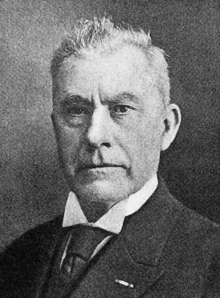M.W. Beijerinck
| Martinus Beijerinck | |
|---|---|
 |
|
| Born |
16 March 1851 Amsterdam, Netherlands |
| Died |
1 January 1931 (aged 79) Gorssel, Netherlands |
| Alma mater | Leiden University |
| Known for | One of the founders of virology and environmental microbiology Conceptual discovery of virus (tobacco mosaic virus) Enrichment culture Biological nitrogen fixation Sulfate-reducing bacteria Nitrogen fixing bacteria Azotobacter (Azotobacter chroococcum) Rhizobium Desulfovibrio desulfuricans (Spirillum desulfuricans) |
| Awards | Leeuwenhoek Medal (1905) |
| Scientific career | |
| Fields | Microbiology |
| Institutions |
Wageningen University Delft School of Microbiology (founder) |
| Influenced | Sergei Winogradsky |
Martinus Willem Beijerinck (16 March 1851 – 1 January 1931) was a Dutch microbiologist and botanist. He is often considered one of the founders of virology and environmental microbiology. In spite of his numerous pioneering and seminal contributions to science in general, he was never awarded the Nobel Prize.
Born in Amsterdam, Beijerinck studied at the Technical School of Delft, where he was awarded the degree of Chemical Engineer in 1872. He obtained his Doctor of Science degree from the University of Leiden in 1877.
At the time, Delft, then a Polytechnic, did not have the right to confer doctorates, so Leiden did this for them. He became a teacher in microbiology at the Agricultural School in Wageningen (now Wageningen University) and later at the Polytechnische Hogeschool Delft (Delft Polytechnic, currently Delft University of Technology) (from 1895). He established the Delft School of Microbiology. His studies of agricultural and industrial microbiology yielded fundamental discoveries in the field of biology. His achievements have been perhaps unfairly overshadowed by those of his contemporaries, Robert Koch and Louis Pasteur, because unlike them, Beijerinck never studied human disease.
In 1885 he became member of the Royal Netherlands Academy of Arts and Sciences.
He is considered one of the founders of virology. In 1898, he published results on the filtration experiments demonstrating that tobacco mosaic disease is caused by an infectious agent smaller than a bacterium.
...
Wikipedia
